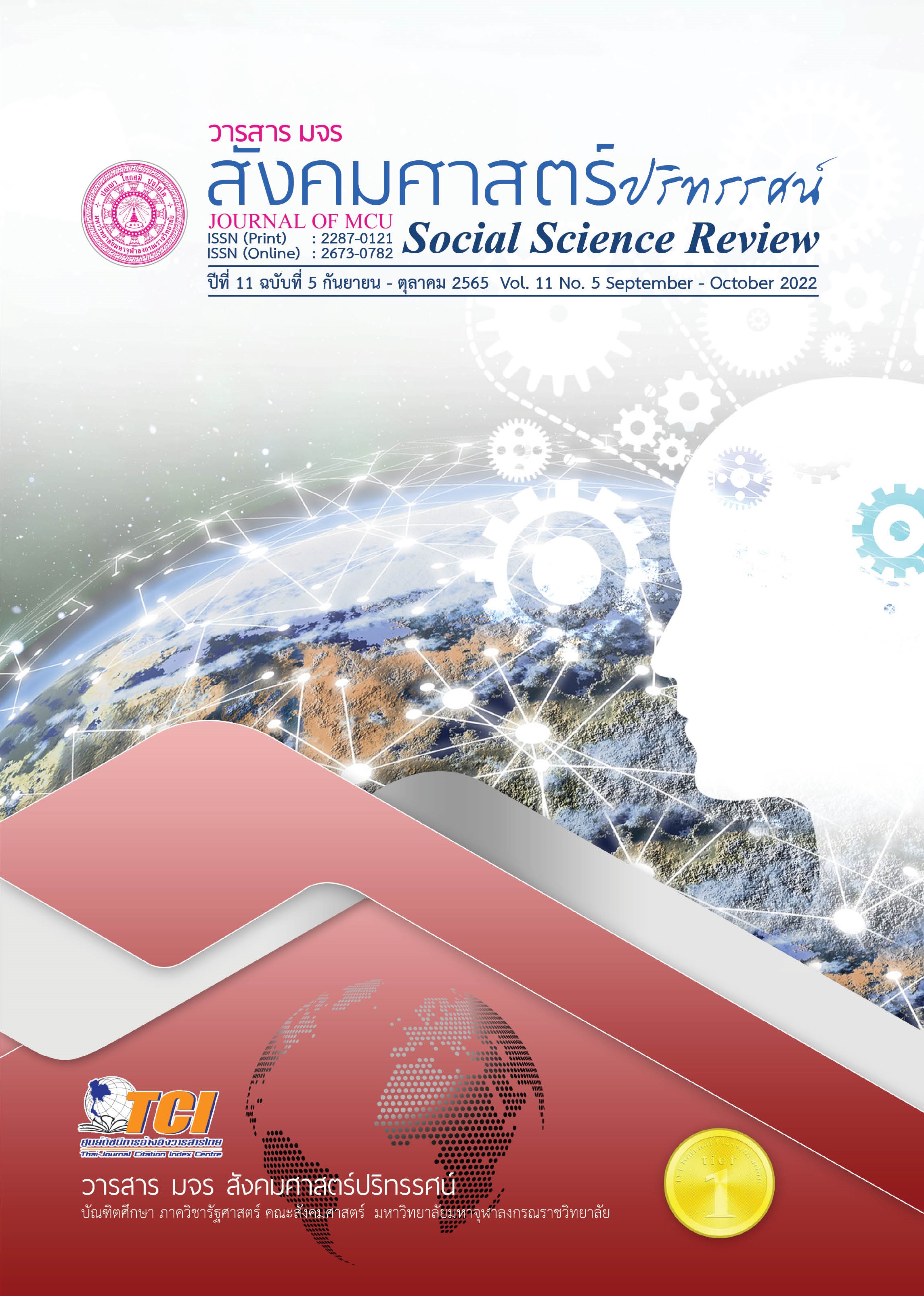การพัฒนาการบริหารจัดการโครงการโรงเรียนรักษาศีล 5 ด้วย 7 กิจวัตรความดี จังหวัดสมุทรสงคราม
คำสำคัญ:
การพัฒนา, โรงเรียนรักษาศีล 5, 7 กิจวัตรความดีบทคัดย่อ
บทความวิจัยนี้มีวัตถุประสงค์เพื่อศึกษาสภาพทั่วไป ศึกษากระบวนการ และนำเสนอการพัฒนาการบริหารจัดการโครงการโรงเรียนรักษาศีล 5 ด้วย 7 กิจวัตรความดี ใช้ระเบียบวิธีการวิจัยเชิงคุณภาพ ด้วยการสัมภาษณ์เชิงลึก จากพระสังฆาธิการ บุคลากรสำนักงานพระพุทธศาสนาจังหวัด ผู้นำชุมชน ประชาชนและนักวิชาการทางด้านการจัดการเชิงพุทธ ด้วยการเลือกแบบเจาะจง จำนวน 25 รูปหรือคน ได้ใช้แบบสัมภาษณ์แบบมีโครงสร้าง และการสนทนากลุ่มเฉพาะผู้ทรงคุณวุฒิ จำนวน 10 รูปหรือคน โดยวิเคราะห์ข้อมูลด้วยเทคนิคการวิเคราะห์เนื้อหาประกอบบริบท
ผลการวิจัยพบว่า 1. มีการเรียนการสอนที่สอดแทรกหลักธรรม ประยุกต์หลักพุทธธรรมเข้าไปในหลักสูตรการเรียนการสอน จัดเข้าในกิจกรรมการเรียนรู้ของแต่ละรายวิชา แต่งบประมาณในการสนับสนุนยังไม่เพียงพอ 2. กระบวนการวางแผนในการบริหารจัดการ ได้แก่ การจัดประชุมเพื่อสร้างความตระหนักและความเข้าใจกับทุกฝ่ายที่เกี่ยวข้อง จัดทำแผนในการจัดกิจกรรมเพื่อการพัฒนาคุณธรรมจริยธรรมและทักษะชีวิตให้แก่ผู้เรียน 3. การพัฒนาการบริหารจัดการโครงการโรงเรียนรักษาศีล 5 ด้วย 7 กิจวัตรความดี ได้แก่ การปรับภูมิทัศน์ของโรงเรียนให้เป็นสถานที่มีบรรยากาศเอื้อต่อการเรียนรู้พุทธธรรมและการศึกษาหาความรู้เพิ่มเติม การจัดทำป้ายนิเทศ ป้ายคำขวัญ ป้ายคติธรรมสอนใจต่างๆ ให้สามารถมองเห็นได้ง่าย การสร้างบรรยากาศภายในโรงเรียนให้เป็นบรรยากาศแบบธรรมชาติ มีความร่มรื่น สะอาด และสวยงาม การจัดกิจกรรมในวันสำคัญทางพระพุทธศาสนา การพัฒนาผู้เรียนให้เกิดการเรียนรู้ทั้งในด้าน ความประพฤติ (ศีล) จิตใจ (สมาธิ) และปัญญา (ปัญญา)
เอกสารอ้างอิง
คณิตดา กรรณสูต. (2565). ปัจจัยที่ส่งผลต่อการบริหารจัดการองค์กรคุณภาพของบริษัทมหาชนจำกัด. วารสารวิชาการรัฐศาสตร์และรัฐประศาสนศาสตร์, 4(1), 31-45.
จุมพล พูลภัทรชีวิน และคณะ. (2549). การวิจัยและพัฒนากระบวนการสร้างความดีมีคุณธรรม. กรุงเทพฯ: ศูนย์ส่งเสริมและพัฒนาพลังแผ่นดินเชิงคุณธรรมสำนักงานบริหารและพัฒนาองค์ความรู้ (องค์การมหาชน).
ทรงวิทย์ แก้วศรี. (2550). การศึกษาวิเคราะห์ยุทธวิธีในการประกาศศาสนาของพระพุทธเจ้า (ปริญญาพุทธศาสตรดุษฎีบัณฑิต สาขาวิชาพระพุทธศาสนา). พระนครศรีอยุธยา: มหาวิทยาลัยมหาจุฬาลงกรณราชวิทยาลัย.
บัญชายุทธ นาคมุจลิน. (2556). รูปแบบการพัฒนาศาสนาทายาทที่พึงประสงค์ในพระพุทธศาสนา (วิทยานิพนธ์พุทธศาสตรดุษฎีบัณฑิต สาขาวิชาพระพุทธศาสนา). พระนครศรีอยุธยา: มหาวิทยาลัยมหาจุฬาลงกรณราชวิทยาลัย.
ปริทรรศน์ พันธุบรรยงก์. (2545). แผนภูมิสุดยอดกลยุทธ์การจัดการ. กรุงเทพฯ: มณีสร.
พระครูนิวิฐศีลขันธ์ (ณรงค์ ฐิตวฑฺฒโน). (2556). รูปแบบการพัฒนาทุนมนุษย์ตามหลักพุทธธรรมในองค์กรปกครองส่วนท้องถิ่น (วิทยานิพนธ์พุทธศาสตรดุษฎีบัณฑิต สาขาวิชาการจัดการเชิงพุทธ). พระนครศรีอยุธยา: มหาวิทยาลัยมหาจุฬาลงกรณราชวิทยาลัย.
พระมหากฤษฎา กิตฺติโสภโณ. (2559). การสร้างความปรองดองสมานฉันท์ ด้วยการขับเคลื่อนโครงการหมู่บ้านรักษาศีล 5 จังหวัดพระนครศรีอยุธยา. วารสาร มจร สังคมศาสตร์ปริทรรศน์, 5(3), 55-62.
พระวิมาน คมฺภีรปญฺโญ (ตรีกมล). (2555). การศึกษาวิเคราะห์ศีล 5 ในฐานะเป็นรากฐานของสันติภาพ (วิทยานิพนธ์พุทธศาสตรดุษฎีบัณฑิต สาขาวิชาพระพุทธศาสนา) . พระนครศรีอยุธยา: มหาวิทยาลัยมหาจุฬาลงกรณราชวิทยาลัย.
สาคร สุขศรีวงศ์. (2552). การจัดการ : จากมุมมองนักบริหาร (พิมพ์ครั้งที่ 5). กรุงเทพฯ: บริษัท จี. พี. ไซเบอร์พริ้นท์ จำกัด.
Fitzpatrick, J.L., et al. (2010). Program Evaluation: Alternative Approaches and Practical Guidelines (4th Edition). New York: Pearson.
ดาวน์โหลด
เผยแพร่แล้ว
รูปแบบการอ้างอิง
ฉบับ
ประเภทบทความ
สัญญาอนุญาต
ลิขสิทธิ์ (c) 2022 วารสาร มจร สังคมศาสตร์ปริทรรศน์

อนุญาตภายใต้เงื่อนไข Creative Commons Attribution-NonCommercial-NoDerivatives 4.0 International License.
เพื่อให้เป็นไปตามกฎหมายลิขสิทธิ์ ผู้นิพนธ์ทุกท่านต้องลงลายมือชื่อในแบบฟอร์มใบมอบลิขสิทธิ์บทความให้แก่วารสารฯ พร้อมกับบทความต้นฉบับที่ได้แก้ไขครั้งสุดท้าย นอกจากนี้ ผู้นิพนธ์ทุกท่านต้องยืนยันว่าบทความต้นฉบับที่ส่งมาตีพิมพ์นั้น ได้ส่งมาตีพิมพ์เฉพาะในวารสาร มจร สังคมศาสตร์ปริทรรศน์ เพียงแห่งเดียวเท่านั้น หากมีการใช้ภาพหรือตารางหรือเนื้อหาอื่นๆ ของผู้นิพนธ์อื่นที่ปรากฏในสิ่งตีพิมพ์อื่นมาแล้ว ผู้นิพนธ์ต้องขออนุญาตเจ้าของลิขสิทธิ์ก่อน พร้อมทั้งแสดงหนังสือที่ได้รับการยินยอมต่อบรรณาธิการ ก่อนที่บทความจะได้รับการตีพิมพ์ หากไม่เป็นไปตามข้อกำหนดเบื้องต้น ทางวารสารจะถอดบทความของท่านออกโดยไม่มีข้อยกเว้นใดๆ ทั้งสิ้น





